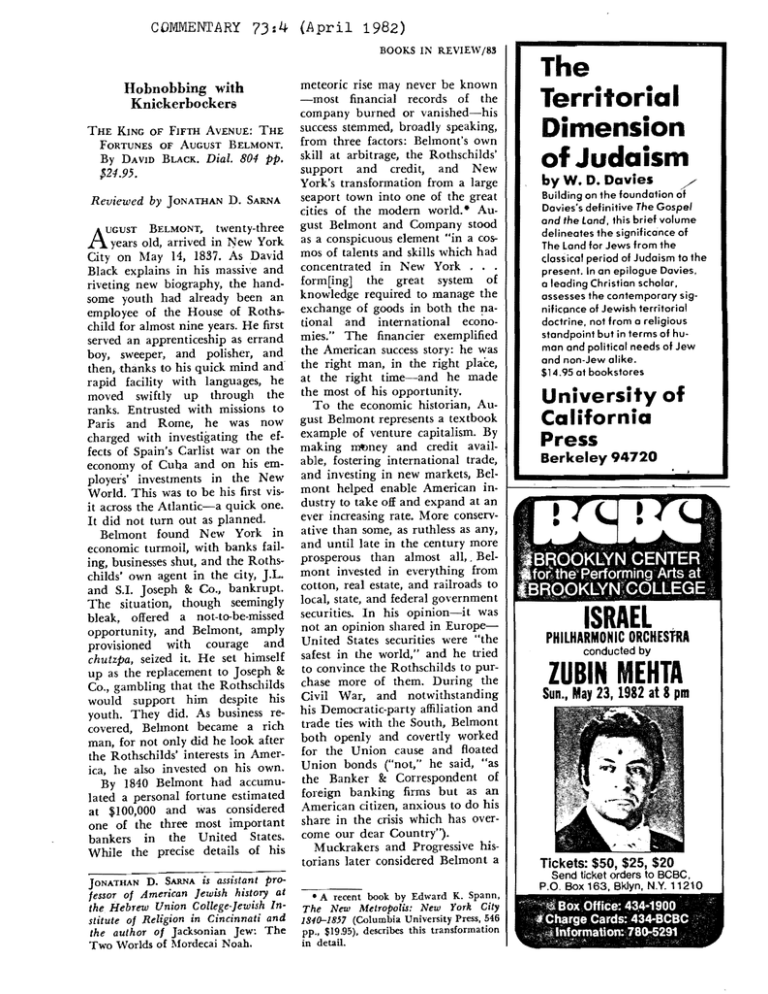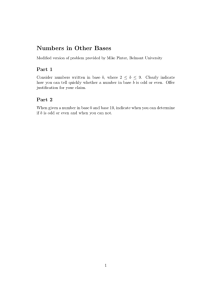Document 14674214
advertisement

COMMENTARY 73:4 (April 1982) BOOKS IN REVIEW /83 Hobnobbing with Knickerbockers THE KING OF FIFTH AVENUE: THE FORTUNES OF AUGUST BELMONT. By DA VlD BLACK. Dial. 804 pp. $24.95. Reviewed by JONATHAN D. SARNA A UGUST BELMONT, twenty-three ..t1.. years old, arrived in New York City on May 14, 1837. As David Black explains in his massive and riveting new biography, the handsome youth had already been an employee of the House of Rothschild for almost nine years. He first served an apprenticeship as errand boy, sweeper, and polisher, and then, thanks to his quick mind and rapid facility with languages, he moved swiftly up through the ranks. Entrusted with missions to Paris and Rome, he was now charged with investigating the effects of Spain's Carlist war on the economy of Cuba and on his employers' investments in the New World. This was to be his first visit across the Atlantic-a quick one. It did not turn out as planned. Belmont found New York in economic turmoil, with banks failing, businesses shut, and the Rothschilds' own agent in the city, J.L. and S.I. Joseph &: Co., bankrupt. The situation, though seemingly bleak, offered a not-to-be-missed opportunity, and Belmont, amply provisioned with courage and chutzpa, seized it. He set himself up as the replacement to Joseph &: Co., gambling that the Rothschilds would support him despite his youth. They did. As business recovered, Belmont became a rich man, for not only did he look after the Rothschilds' interests in America, he also invested on his own. By 1840 Belmont had accumulated a personal fortune estimated at $100,000 and was considered one of the three most important bankers in the United States. While the precise details of his JONATHAN D. SARNA The Territorial Dimension of Judaism meteoric rise may never be known -most financial records of the company burned or vanished-his success stemmed, broadly speaking, from three factors: Belmont's own skill at arbitrage, the Rothschilds' support and credit, and New York's transformation from a large seaport town into one of the great cities of the modern world.· August Belmont and Company stood as a conspicuous element "in a cosmos of talents and skills which had con centra ted in New York . . . form [ing] the great system of knowledge required to manage the exchange of goods in both the national and international economies." The financier exemplified the American success story: he was the right man, in the right place, at the right time-and he made the most of his opportunity. To the economic historian, August Belmont represents a textbook example of venture capitalism. By making lOOney and credit available, fostering international trade, and investing in new markets, Belmont helped enable American industry to take off and expand at an ever increasing rate. More conservative than some, as ruthless as any, and until late in the century more prosperous than almost all,. Belmont invested in everything from cotton, real estate, and railroads to local, state, and federal government securities. In his opinion-it was not an opinion shared in EuropeUnited States securities were "the safest in the world," and he tried to convince the Rothschilds to purchase more of them. During the Civil War, and notwithstanding his Democratic-party affiliation and trade ties with the South, Belmont both openly and covertly worked for the Union cause and floated Union bonds ("not," he said, "as the Banker &: Correspondent of foreign banking firms but as an American ci tizen, anxious to do his share in the crisis which has overcome our dear Country"). Muckrakers and Progressive historians later considered Belmont a by W. D. Davies University of California Press Berkeley 94720 , . ISRAEL PHILHARMONIC ORCHEStRA conducted by ZUBIN MEHTA Sun., May 23, 1982 at 8 pm Tickets: $50, $25, $20 Send ticket orders to sese, P.O, Box 163, Bklyn, N.Y. 11210 pro- fessor of American Jewish history at the Hebrew Union College-Jewish Institute of Religion in Cincinnati and the author Of Jacksonian Jew: The Two Worlds of Mordecai Noah. / Building on the foundation of Davies's definitive The Gospel and the tond, this brief volume delineates the significance of The Land for Jews from the c;lassical period of Judaism to the present. In an epilogue Davies, a leading Christian scholar, assesses the contemporary signifiqmce of Jewish territorial doctrine. not from a religious standpoint but in terms of hu· man and political needs of Jew and non-Jew alike. $14.95 at bookstores • A recent book by Edward K. Spann, The New Metropolis: New York City 1810-1857 (Columbia University Press, 546 pp., $19.95), describes this transformation in detail. "". '-:~~ Box Office: 434-1900 . ;' . «Cllarge Cards: 434-BCBC :". ,",.~ Information:-780-5291 y.' t' ~ "~"i1'$'; A , ~_,~ 84jCOMMENTARY APRIL 1982 disgraceful "robber baron," and Matthew Josephson coupled him with such "swine, jackals, and wolves" as the Dixes, Astors, Morgans, and Goldschmidts. But while he was no paragon of virtue, Belmont-and this holds true for most other "robber barons" as well-was a man of personal integrity. His business depended upon it; his customers and country benefited from it. Politically, August Belmont supported the Democrats." At first he only voted for them, later he worked for them, and still later, from 1860 to 1872, he chaired their national committee. Irving Katz, in August Belmont: A Political Biography (1968), has shown that he, more than any other single person, insured the survival of the Democratic party after the death of Stephen A. Doughis, when it entered its "most disastrous epoch": the divisive Civil \Var years and the spell of ugly anti-Democratic recriminations which followed them. Belmont had money, energy, and organizing ability; he commanded loyalty and he was loyal; he never faltered in his support for the Union indivisible. Though during his tenure as chairman his party never won the Presidency, when it did win, with Grover Cleveland in 1884, he was awarded some of the credit. "The success," Maryland Senator Arthur P. Gorman wrote him, "would not have been possible but for the foundation laid by you." \VHlLE Belmont's politics found its historian in Irving Katz, until David Black's new work far less has been known about the other August Belmont, the family man and society mogul. During his lifetime, Belmont was credited with having "taught New Yorkers how to eat, how to drink, how to dress, how to drive four-in-hands, how to furnish their houses, [and] how to live generally according to the rules of the possibly somewhat effete but unquestionably refined society of the Old World." The claim, though somewhat exaggerated-John Jacob Astor and those whom Nathaniel P. Willis dubbed the "Upper Ten" also taught New Yorkers a thing or two--is perhaps not that far off the mark. The "King of Fifth Avenue," as Black calls him, was conspicuous consumption personified, a condition heightened by his marriage to Caroline Slidell Perry, daughter of Commodore Matthew C. Perry (Belmon t was thirty-six, Caroline nineteen; he was Jewish, she Episcopalian). Parties, possessions, progeny, and horseracing, along with omnipresent threats of scandal, seem to have occupied a large fraction of the couple's time. Black relates that at one memorable soiree, Belmont presided over a table that seated two hundred and was set with gold service. Each guest was attended by his or her own footman, who was dressed in maroon and scarlet Belmont livery and who soundlessly presented dishes and cleared away the empty plates as skillfully as a magician palming large gold coins. o Small wonder that the Belmont children, growing up, sought leisure over learning, never had enough money, played far harder than they worked, and often fell into trouble. This theme is a familiar one. The names and anecdotes change, the message remains ever the same. WHAT does distinguish Belmont, and what lends his biography special significance, is the matter of religion. New York society knew other wealthy Jews in the pre-Civil War period; no fewer than seven were listed in Moses Beach's 1845 directory of the city's wealthiest men. But most of these Jews, like most members of the German-Jewish elite ("Our Crowd"), affiliated with the Jewish community and belonged to one or another synagogue, whether they attended it or not. Belmont, claiming that his "co-religionists in this country [were] too disagreeable," did not follow this route, For reasons that may only be speculated upon, he completely avoided the Jewish community. Black suggests that the established Jewish families may upon his arrival have avoided him, as an immigrant upstart. More likely. Belmont found it embarrassing to be in the company of S.l. Joseph, who remained a prominent member of the Jewish com- munity long after Belmont replaced him as the Rothschilds' agent. \Vhatever the case, Belmont clearly preferred hobnobbing with Knickerbockers, who held the prestige and power that he craved, to the company of Jews. So he kept his Judaism quiet and quickly succeeded in establishing himself in Christian society. His intermarriage presumably came as no surprise, and neither did the baptism of his children. But though a closet Jew with a Christian family, Belmont neither denied his Judaism nor became an apostate. He claimed that "liberal views" permitted him to marry out; still, he wrote his sister. "I should not have liked to become a renegade." In America he could achieve social prominence without becoming a Christian; the Protestant elite admitted him regardless. Yet in striving for two worlds, Belmont frequently found himself in neither. Opponents reminded him that, marriage notwithstanding, he remained a Jew.• To reinforce this lesson, they tended to add "Jew" to his name whene\"er they felt he did something wrong. Ex-President James Buchanan once angrily referred to him as "a speculating German Jew," while national newspapers during the Civil War regularly called him "the Jewbroker': and questioned his patriotism. For their part, Jews, th~ugh they sometimes defended him from attack, generally did not seek too close an association with one so distant from his people. One Jewish newspaper went so far as to break with him entirely: "Though a Jew by birth ... [Belmont] married out of the faith many years ago, is not connected with a Jewish congregation, and is universally repudiated as a Jew." Of course, when he had done something noble even those who had disowned him were quick to claim him back. Still, the overall relationship between Belmont and the Jewish community remained ambivalent at best. The ambivalence is understandable. On the one hand, Belmont represented the American dream: proof that anyone, even a Jew, could rise to unimaginable heights BOOKS IN REVIEW/S!) through intelligence and hard work. On the other hand, he represented the Jewish nightmare: secularism, assimilation, intermarriage, loss of identity-in sum, America's challenge to Jewish survival. AMERICAN Jewish history is strewn with Belmont-type figures. Except for converts (and there have been plenty of those), they represent the most extreme form of Jewish accommodation to the American scene. On a spectrum stretching from total assimilation to uncompromising traditionalism they lie but inches away from the leftmost point. Judah Benjamin-orilliant lawyer, Senator from Louisiana, and a leader of the Confederacy-stands out as a prominent example of this category. A contemporary of Belmont's, he too intermarried and maintained no formal ties to the Jewish community. He too was reminded of his Judaism by others, Jews and Gentiles alike. He too refused to convert, but permitted his children to be raised in their mother's faith. • Bernard Baruch, 'Walter Lippmann, and innumerable others, well known and unknown, follow in this same tradition. While they may espouse different views con-. cerning the value of Judaism, or display different levels of selfhatred, all insist that their Jewishness means little--certainly not enough to pass on to their children. To be an American in their eyes is enough. The survival of Judaism is not their concern. There remains a certain significance in the fact that Belmont-type Jews nevertheless do not convert. Historically, many European countries demanded baptism as "the entrance ticket to European culture" -in the phrase of Heinrich Heine, who himself became such an apostate. America made no such demands. While Jews never had as easy a time as Protestants, they could scale the heights of society without belonging to a church. In remaining Jews, such assimilationists~ven when they have evinced no interest in the continued existence of Jews or Judaism-have upheld this important principle. One need not applaud them morally or religiously to acknowledge that this fact speaks volumes about America's religious tradition. The Present Danger LE SPECTATEUR El\'GAGE. By RAYMOl\'D ARON. Julliard. 339 pp. 73 francs. DEVANT LA GUERRE. By CORNELIUS CASTORIADIS. Fayard: 285 pp. 70 francs. Reviewed by Seon MCCONNELL HE considerable impact that these. two quite different books have made in France is a testament to substantial changes that have occurred in the French intellectual climate over the past several years. The degradation of the Soviet Union's image in France is the most striking aspect of a more profound evolution. Major intellec- T a new contributor, is a doctoral candidate in European history at Columbia University' who is currently doing research in France. SCOTT JOHNS HOPKINS JOURNALS Please enter a one-year subscription for ' all three 1982 issues of: New in Judaic Studies-In~depth research on Jewish culture for students of Judaica, professors, and rabbis MODERN JUDAISM PROOITEXTS (February, May, October) Individuals $14 Institutions $ZZ (January, May, September) Individuals $15 Inst\-tutions $24 PROOFTEXTS MODERN A Journal of Jewish Literary History JUDAISM Alan Mimz and David G. Roskies, Editors Steven T. Katz, Edicar T elevant, timely discussions probe the meaning and richness of Jewish experience since the Haskalah. Modern Judaism examines Jewish life and thought in relation to history, philosophy, and the social sciences. Recent articles feature: Irving Louis Horowitz, "Many Genocides, One Holocaust" Leo Strauss, "Progress or Return? The Comtemporary Crisis in Western Civilization" he first English language journal to explore the full and vital literary heritage of the Jewish people. Prooftexts offers an innovative forum for literary and cultural analysis based on Hebrew, Yiddish, and American texts. Recent issues include: Shaye J. D. Cohen, "From Scripture to Midrash" James Kugel, "On the Bible and Literary Criticism" Dan Miron, "Rediscovering Haskalah , Poetry" • $15 o o o o Payment: o Check or money order enclosed or o Visa R .$14 0 MasterCard Account # _ _ _ _ _ _ Exp. date _ _ Signature _ _ _ _ _ _~_ _ _ __ Address: Name _ _ .. _ _ _ _ _ _ _ _ __ Address _ _ _ _ _ _ _~_ _ __ City Bl Send orders to: The Johns Hopkins University Press Journals Division Baltimore, MD 21218 Pteptrymeru required. Calendar-year subscriPtions only . Maryland residents add 5% fO.X.




